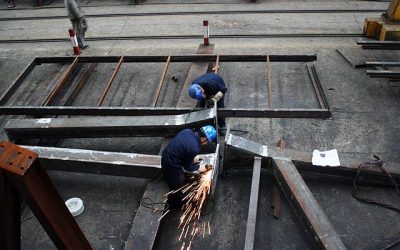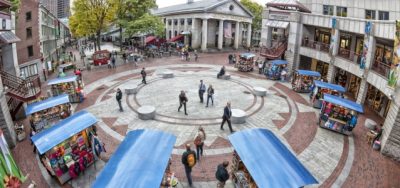Entrepreneurship & Innovation

Immigrant Entrepreneurs Driving Growth in America’s Heartland
When Jordi Carbonell, originally from Spain, and his wife Melissa Fernandez opened their Cafe Con Leche coffee shop several years ago in southwest Detroit, the couple founded their business on the idea that the neighborhood needed a central gathering place to create a strong community. Today,… Read More

Revitalization in the Heartland of America
A potent combination of declining population growth and economic stagnation has led many cities and metropolitan regions to rethink how to reinvigorate their communities. The Midwest is a prime example of this trend. According to the Chicago Council on Global Affairs, “the Midwest cannot hope to keep up with other regions or international competitors without a vital entrepreneurial sector.” The Council notes that “immigrants, risk takers by nature, are unusually successful entrepreneurs, more than twice as likely as native-born Americans to start their own firms.” As a result, immigration is one of the strategies to which communities are repeatedly turning to fuel economic growth. A budding place-based awareness of the important contributions that new and existing immigrants make to neighborhood revitalization is seen in the increasing number of cities pursuing a nexus of immigrant welcoming, integration, and economic development initiatives. In this report, we focus on the journeys of three places—two cities and one state—in their efforts to implement strategies for future economic success that depend on immigration. The initiatives are taking place against a backdrop of tepid progress toward comprehensive federal reform of the U.S. immigration system. Read More

Immigrant Entrepreneurs are Investors in their Communities
Cedric Francois, a medical researcher from Belgium, came to Louisville, Kentucky, after hearing that researchers there were beginning work on the first hand transplant. Later, he co-founded two pharmaceutical companies. Suhas Kulkarni, an immigrant entrepreneur himself who founded Louisville-based IT firm Omnisys, understands the need for integrating and helping immigrant entrepreneurs get their start and is leading the area’s new Refugees and Immigrants Succeeding in Entrepreneurship (RISE) initiative. This is a collaborative effort among public and private organizations to support immigrants and refugees in the entrepreneurial endeavors in the Louisville area. RISE recognizes that Louisville “has an untapped pool of talent for city-wide economic development in the form of immigrants and refugees” and that “this population has the potential of becoming drivers of economic growth” for the region. Immigrant entrepreneurs are often vital assets in communities. They start businesses, create jobs, and encourage community revitalization efforts. Immigrant businesses can help revive dilapidated or aging retail corridors. And they provide an opportunity for immigrants to reinvest in the area. Take for example Vilmar Zenzen, originally from Brazil, who is opening a new upscale Brazilian steakhouse in downtown Louisville. Zenzen already operates another Brazilian steakhouse in Knoxville, Tennessee. Read More

Licensing Barriers Leave Immigrant Doctors Driving Cabs Instead of Practicing Medicine
Instead of putting foreign medical and other advanced degrees to use in the United States, it is common among immigrant doctors and other professionals to work less skilled jobs, such as a taxi driver or waiter, because the complicated licensing process keeps them from applying their training in the U.S. market. According to a recent Migration Policy Institute (MPI) series of reports on improving credential recognition, the United States is experiencing a “brain waste” by preventing immigrants living in the country from efficiently transferring their foreign credentials. MPI’s most recent report concludes their series by exploring prospects for international recognition of foreign qualifications. Read More

How Immigrants on a Pathway to Citizenship can Revitalize Rust Belt Cities
Like Rust Belt cities such as Baltimore and Detroit, rural towns across America have experienced population declines in recent decades. Some places, however, are an exception to that trend thanks in part to the arrival of immigrants. For example, while other Iowa towns experienced population decline over the past several decades, West Liberty’s population grew because of immigration. As Steve Hanson, superintendent of West Liberty Community School District, notes, “in the last 20-30 years we would have had a population decline if we hadn’t had immigrants come in [for] jobs in the food manufacturing business. They provide a source of labor that wouldn’t have been there.” And West Liberty’s Mayor, Chad Thomas, said immigration has “kept a lot of storefronts and businesses open that probably otherwise would have closed.” Read More

How Would Immigration Reform Help the U.S. Economy?
A growing consensus has emerged among both liberals and conservatives that immigration reform would serve as a stimulus to the U.S. economy. Reform would not only raise the wages—and therefore the tax payments and consumer purchasing power—of newly legalized immigrants, but would ensure future flows of immigrant workers, taxpayers, and consumers that are sufficient to meet the labor-force needs of our rapidly aging society. Conversely, trying to enforce our way out of a dysfunctional immigration system only wastes taxpayer dollars while exacting a high toll in both human lives and missed economic opportunities. Read More

It’s Immigrant Entrepreneurship Month in Massachusetts!
Massachusetts is no stranger to the many benefits immigrant entrepreneurs bring to communities. From family owned restaurants and shops along small town main streets, to large Fortune 500 companies, immigrant-owned businesses make sizeable contributions to Massachusetts. And as a growing number of places around the country make efforts to attract and welcome immigrants, Massachusetts continues to expand the state’s efforts. October 15 marked the start of the third annual Massachusetts Immigrant Entrepreneurship Month, which will officially run through November 15. State groups—including the Immigrant Learning Center (ILC), the New Americans Integration Institute at the Massachusetts Immigrant and Advocacy Coalition (MIRA), and the state’s Office for Refugees and Immigrants—are leading the initiative, which recognizes the contributions of immigrant business owners and innovators to Massachusetts’ economic development. Read More

From Coast to Coast, Immigrants Drive Local Economies
Immigrant entrepreneurship has transformed Atlanta’s northeastern suburbs along and near Buford Highway into “International Village” – an area filled with immigrant restaurants, markets, specialty stores, and other businesses. Through ventures such as Chinatown Square, Asian Square Mall, and Plaza Fiesta immigrants have “economically and socially revived an area that faced economic stagnation and population decline.” As one researcher noted, “the five-mile stretch of highway running through Chamblee, Doraville, and Norcross constitutes the greatest concentration of ethnic-owned businesses in the southeastern U.S.” Read More

White House Honors Local Groups Leading the Way to Welcome Immigrants in Their Cities
Thousands of immigrants every day demonstrate a commitment to being part of America by becoming naturalized citizens every day. These Americans by choice often make huge sacrifices to move to the United State and become part of their community. But it also takes support from the local community to welcome new immigrants who want to establish roots in the area. Groups across the country are stepping up to fill that role and make their cities inviting to immigrants. Read More

Immigration is a Positive Force for Economic Growth in Cities
Posters on metro buses and trains in St. Louis will now welcome you to the city in 17 different languages, one of the many initiatives begun by the St. Louis Mosaic Project to create an atmosphere that welcomes and encourages immigrants to the area. Signs in the public transit system aren’t just designed to look pretty, however, but acknowledge that for many immigrants, particularly those new to the St. Louis region, this is their primary means of going to work or school, shopping, and taking part in all the community has to offer. “The Mosaic Project says a lot about where our region is going,” St. Louis County Executive Charlie Dooley said. “We want to be more diverse and see things from different points of view.” Read More
Make a contribution
Make a direct impact on the lives of immigrants.
